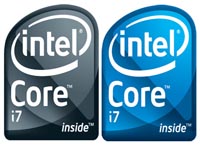The computer helper: Intel's new i7 chips
 Washington - Move over, Core 2 Duo. Move over, Core 2 Quad. Intel's new i7 processor is showing up in new computers around the world. Intel is billing the i7 as "the best desktop processor in the world," and indeed it offers some substantial improvements - in both speed and architecture - over previous models. But is the i7 worth your money? Will it make help you get your work done faster? And will it make your current PC obsolete? Read on for some answers.
Washington - Move over, Core 2 Duo. Move over, Core 2 Quad. Intel's new i7 processor is showing up in new computers around the world. Intel is billing the i7 as "the best desktop processor in the world," and indeed it offers some substantial improvements - in both speed and architecture - over previous models. But is the i7 worth your money? Will it make help you get your work done faster? And will it make your current PC obsolete? Read on for some answers.
Q: What's new about the i7?
A: A lot. The i7 was designed from the ground up with speed and energy efficiency in mind. To maximise speed, the i7 includes an new, integrated memory controller that does away with the reliance of previous chips on the so-called "front side bus," and in its place is a new data transmission channel dubbed QuickPath, which can transmit information at up to 25 gigabytes per second, depending upon chip version.
The first i7s out the door are quad-core designs, and all four cores are integrated onto the same piece of silicon for the first time to increase efficiency. Each core can process two instructions at once - a technology known as multithreading. Thanks to multithreading, each i7 processor looks like eight separate processing units to the operating system.
The i7s also introduce a new type of overclocking called "turbo boost." Essentially, turbo boost temporarily pushes the performance of individual cores when a program requires it, squeezing more speed out of the chip than it normally provides. Thus chips can push themselves when processing demands are heavy, and they can throttle back to stock speeds under normal computing loads.
For power management and efficiency, the i7 includes a dedicated core that monitors power use, ensuring that the chip balances efficiency with suitable power usage.
Currently there are only three i7 chips available. The i7 920 runs each core at 2.66 GHz and is the most reasonably priced of the three - retailing for under 300 dollars. The i7
940 ups the clock rate per core to 2.93 GHz, but the price of this new chip almost doubles. At the very high end, Intel has the i7 Extreme Edition 965, which runs each core at
3.2 GHz and supports the highest QuickPath transmission speeds.
Q: How much faster are the new chips than today's core 2 quad chips?
A: Significantly. For standard computing applications as well as processor-intensive video, graphics, and multimedia work, the top-of-the-line i7 processors are up to 64 per cent faster than best-of-breed chips from AMD or former-generation quad core chips from Intel itself.
There is one exception, however: games. The i7 provides little to no performance boost to many of today's 3D games, mostly because current games do not take advantage of the multithreading technology that the i7 incorporates. Newer games should benefit more from the i7.
Q: Can I upgrade my current dual core processor with an i7?
A: No. The i7 processors use a different socket than today's dual-core and quad-core processors. The i7 processor itself is larger than previous generation core 2 duo and core 2 quad chips. The larger size is necessary to accommodate the integrated memory controller and other features of the chip.
So if you wanted to upgrade your existing PC to use an i7, at the least you would have to purchase a new chip and a new motherboard - and either have the pair installed or, if you are tech savvy, install the combo yourself. Realistically you would probably also have to purchase new system memory. The i7 relies on DDR3 memory (RAM), which is not found in many systems today. The is the type of upgrade that would necessitate the purchase of an entirely new computer for most users.
Q: Are there both dual-core and quad-core i7 chips?
A: No. The i7 is a quad-core only processor, at least for now. It's doubtful that a dual-core design will be produced. Four cores - and more - are clearly the future.
Q: If I'm buying a new computer, should I look for one with an i7 processor or look for good deals on machines with older processors?
A: In a period when the tech industry is moving to a new processor architecture, it's usually not a good idea to look for deals on older technology. That's because your upgrade path with the older technology will have a shorter lifespan, and the useful lifespan of your equipment may be lessened.
What's more, the low-end i7 processor is priced competitively with today's dual core and quad core processors, so you should not face a prohibitively higher price by going with the new technology. In the near term, however, the i7 chips are likely to be marketed in higher end computers. You should start to see prices of i7-based PCs moderate by the middle of this year.
Q: Can I get an i7 in a notebook computer?
A: No. Currently i7 processors are desktop-only. The new i7 chips generate a good deal of heat. Intel has stated that mobile versions of the chip should appear late this year.
--- Have a computer question? Send it to the Computer Helper at jayd@csi.com. (dpa)